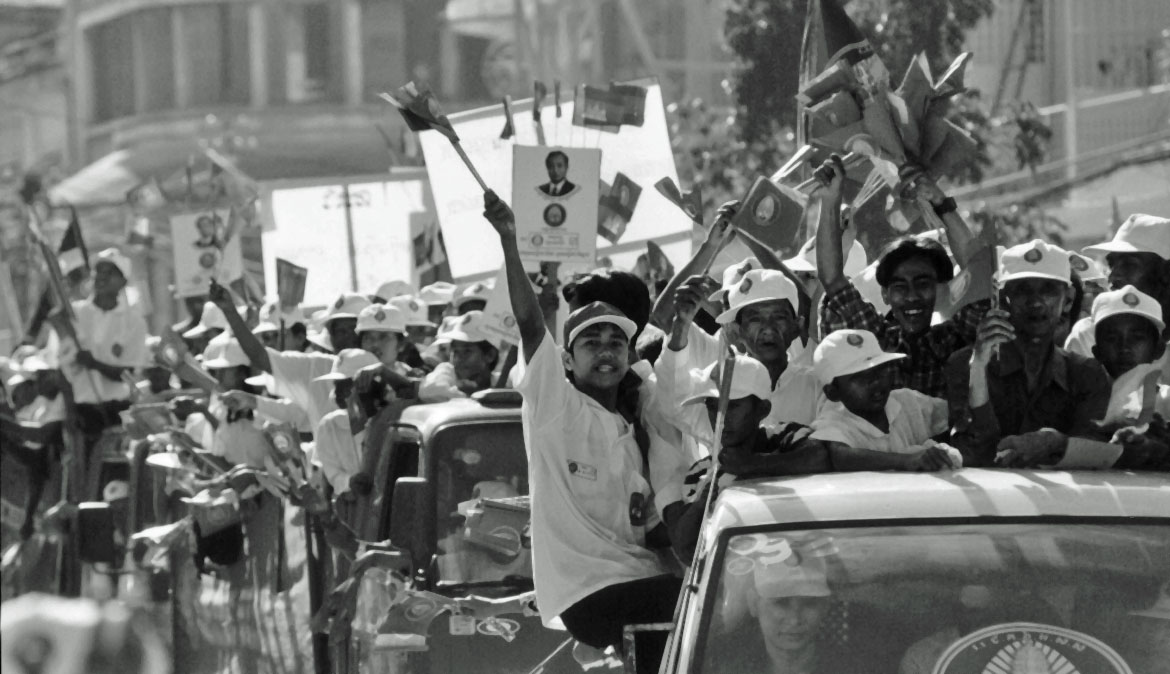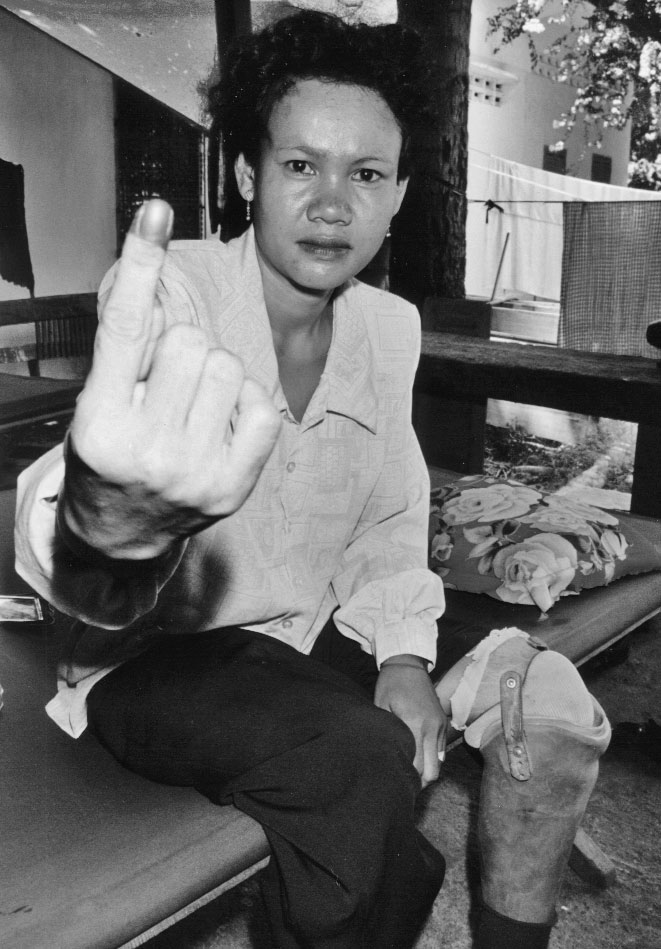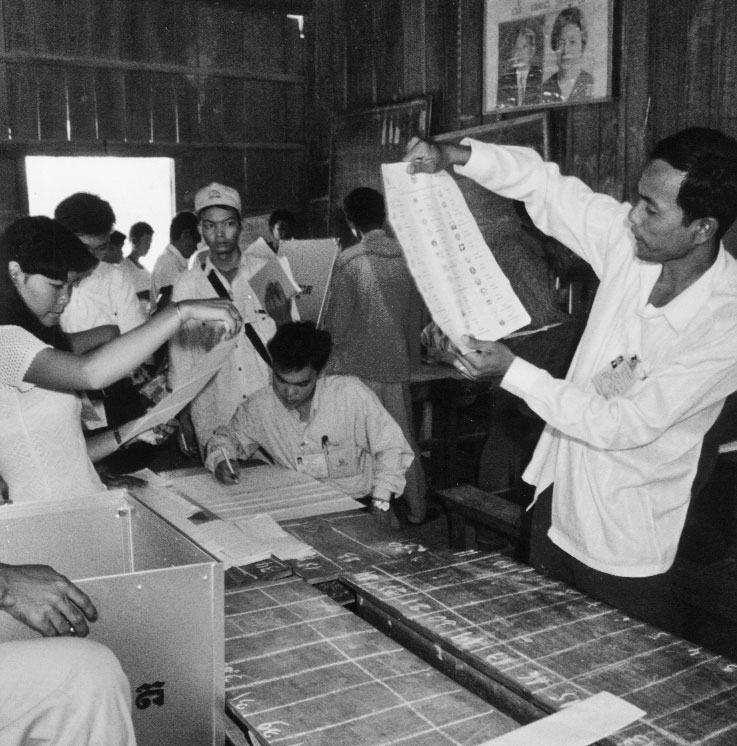Cambodia Sprouting DemocracyAugust 1998
The general election (the Assembly seats:122) was taken place for the first time by Cambodian people on their own on July 26th, and in the election the People’s Party led by Hun Sen won a majority of 67 seats. Japan, having greatly helped Cambodia in the peace agreement and the U.N. Peace Keeping Operations, also gave the biggest help in this election, dispatching 32 observers to monitor the election. I looked around Cambodia before and after the election that would give the finishing touches to peace.
The Cambodian General Election

“The stain of this ink will show that a voting is done, and its color will not fade off for two weeks. So there will be no double voting this time, because people should vote within nine hours,” Ren Sochia, the chief of the National Election Commission, said and put my right index finger in the ink bottle with an impish smile. Even now, I’m writing this article, I can still see that ink stain on my finger.
After the street fighting last summer, the aid and investment discontinued and the financial conditions became tight, but Cambodian people worked very hard, even willing to work all night, to catch up on their preparation for the election. Their effort bore fruit. The election took place as scheduled. Ren Sochia told that their friendly nations supported the election including Japan, which offered 10,500,000 dollars. On the 22nd they got radios with Japanese additional aid, so that there would be no trouble with their communication between the NEC headquarters and the polling places, he said confidently.
Professor Yoda (53) of the international culture department of Kobe University, who came to Phnom Penh as an observer of the election, remarked on his view, “The independence of a nation depends on whether it can administer an election or not. If there is no trouble in the election, Japanese government can give support, both moral and materials.” Even if an observer detected illegality, he/she would only report it to the U.N. by letter without being involved. “The presence of the U.N. which judges fairness acts as a brake on violence,” he said emphatically.

What do the voters expect the government that tries to conduct a fair and free election? Chan Ta (35), who was grilling small fish with his child at the roadside of a slum area in the capital, said, “I like Prime Minister Hun Sen, because he relieved us from the massacre by the Pol Pot government.” He said he supported the People’s Party, but he was at his wit’s end to earn money to live in a decent house. Ten Ha (33) living in a village that suffered from drought said, “I want the government to protect the environment.” He told that the government allowed deforestation along the river and the police connived at Vietnamese fry fishing, with the story of what he had witnessed. He also said, “If the government put a curb on the import of cheap vegetables from Vietnam, we are unable to make a living.” He said he supported the party out of power which set store on environment and human rights. There is no doubt that both the parties will fall into a dilemma as to whether to join the international society where liberalizing is advancing.
Cambodian people realized that the election, which was being watched carefully at home and abroad, was “for themselves.
The internal war that had lasted for more than 20 years inflicted a deep wound on Cambodia. Peck Rom (31), who cannot work at a field because she lost her left leg by explosion of a mine, has just finished a job training course for the physically handicapped. She voted, wishing for getting a job, whatever it was. When she said she had gotten married five months ago, she smiled for the first time. Her husband is also a one-legged person, but peace came to her too.

At the polling place near the airport that was a battlefield last summer, “Nothing wrong has happened in this election. Everything is going well,” contentedly said a watchman Na Rit (43), who fled to Mt. Basack with his seven children. The elementary school teachers who were in the service of NEC as temporary workers were leading voters to an exemplary election, giving instructions not to vote by arrangement. The number of votes here was 563 and the voting rate was 94.1%, which shows that the people put their great hopes on the government.
At seven on the morning of the next day, the 27th, the ballot boxes were opened at the signal of a bang on a wheel hung from a branch of tamarind in the schoolyard. The NEC workers held up the ballots high one by one to let everybody see them and read them aloud. In the village, which didn’t have even a calculator, human-wave tactics was carried out by all the villagers. Their cheerful but serious looks told that they realized the election was really for themselves.
Thus the epoch-making election by voting at 11,699 places of all parts of the country was witnessed by about 500 observers from 34 foreign countries, about 60,000 observers of the local nongovernmental organizations and 300-odd foreign news reporters. A rifle that was supposed to be kept at every polling place was never seen in this peaceful Cambodia.
